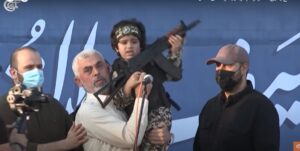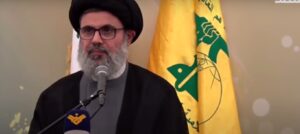Recent developments in the Gaza Strip indicate that Yahya Sinwar, the leader of Hamas, has reinitiated talks with Qatar regarding a prisoner exchange deal with Israel.
This move, suspended after the IDF’s takeover of Shifa Hospital, suggests a potential weakening or fracture in the military wing’s strength.
Simultaneously, Ismail Haniyeh, another key Hamas leader, has embarked on a lobbying campaign with regional leaders, aiming to exert pressure on Israel for a ceasefire.
The need for a five-day pause is clear – to organize forces, reunite disbanded battalions in the north affected by IDF attacks, and replenish essential supplies such as fuel, water, and food.
Despite recognizing the IDF’s threat to any terrorist emerging from tunnels, Sinwar seeks a ceasefire to disrupt the IDF’s attack momentum.
His strategy involves utilizing the pause to increase pressure on Israel, dissuade further action, and potentially harm stationary IDF forces within Gaza.
However, the delay in reaching a ceasefire stems from Sinwar’s indecision.
He strategically stalls to unnerve Israel, asserting Hamas’s influence and avoiding the perception of weakness.
Open voices within Gaza urging Hamas leadership to assess their situation carefully highlight the challenging reality residents face, even though such sentiments are not openly expressed in the Arab media due to fear of Hamas reprisals.
A potential IDF victory and the overthrow of Hamas rule would mark a significant failure for Yahya Sinwar.
The memory of his initiated attack on settlements surrounding Gaza would fade, overshadowed by the narrative of bringing disaster to Palestinians.
This outcome would erase the achievement of the Muslim Brotherhood movement in establishing an armed, independent political entity in the Gaza Strip.
While Sinwar attempts to portray Israel as reaching the end of its path and engages in psychological warfare to encourage emigration, his efforts to ignite a regional war have thus far failed.
Israel’s successful defense against attacks from southern Lebanon and Yemen, coupled with significant losses in the ranks of Hamas and the Gazan population, underscores the mismatch in impact.
Yahya Sinwar acknowledges the Gazan public’s yearning for a ceasefire, but he must navigate this decision carefully to avoid weakening Hamas’s prestige.
Sinwar’s flawed assessment of Israel’s resilience and the strength of the IDF and the lack of support from Hezbollah, Syria, Iraq, and Yemen leave Hamas relatively isolated in the conflict.
As debates continue, Yahya Sinwar faces the dilemma of agreeing to a prisoner exchange deal with Israel.
While he recognizes the need for a ceasefire, he questions whether paying the potential future price is worth it.
With Israel determined to eliminate him and other military leaders, and Hamas’s presence an obstacle to Gaza’s restoration, the challenges ahead are daunting for both sides.
In the midst of ongoing attacks in the Gaza Strip, Yahya Sinwar stands at a crossroads, holding the key to halting the IDF’s momentum through a potential ceasefire.
The ball is in his court as he weighs the complex decisions ahead.


